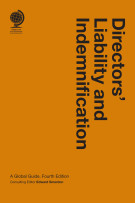More than free gym memberships: the management response to stress and burnout in law firms
11 April 2023

Lisa M. Walker Johnson is a founding principal of Walker Clark LLC. She is an internationally recognized expert in managing complex changes in law firms. Lisa's professional background is as a counseling psychologist, with more than ten years experience in senior levels of business management and human resource development, especially in banking, and more than 25 years experience consulting to law firms and corporate and government legal departments worldwide.
Lisa Walker Johnson, author of Stress and Burnout in Law Firms: Leadership Challenges and Choices, discusses stress and burn out in the practice of law and how leaders can address these issues.
Until recently, legal services organisations have largely discounted or ignored altogether the stress-building impact of everyday conditions in the practice of law. Stress and burnout were considered to be essentially personal problems, the management of which leaders and managers had only tangential responsibility. The emerging reality, however, is that there has been a shift in the compromises that lawyers are willing to make for organisations they feel are indifferent to their negative stress levels. Leaders know their workplace cultures are being scrutinized, including by clients. Clients and leaders alike, are becoming better informed about the risks, including consequences of service providers trying to operate at unabated levels of stress.
There is a delicate balance between workplace stressors, professional productivity and career satisfaction. It’s complicated, and it’s not. Lawyers may respond to the same conditions in different ways, at different times. The intensity and extent of any negative stress they feel as individuals and groups cannot necessarily be predicted by simply identifying possible sources of stress. In addition, Lawyers may repress and conceal the effects of negative stress because they fear the stigma and its often very real consequences.
At the same time, lawyers are not asking for the moon. They are not looking for the absence or the elimination of stress. Instead, they want greater attention paid to how they – as groups and individuals, lawyers and leaders, alike – are experiencing and dealing with ongoing professional stressors. They mainly want to focus on serving clients and developing professionally, but without becoming ill in the process. And they look to leaders to organise methods, resources and goals to do just that.
So, whose job is it to deal with stress and burnout in the legal workplace? What can lawyers expect from management and what do those leaders have a right to expect from lawyers? What do professional relationships mean to lawyers and how does this affect the choices they make in their interactions with each other?
Partners and other decision makers in legal services organisations can be their own worst enemies. Lawyers interact with policies, processes, practices, and systems in their organisations every day. They cite their day-to-day experiences with the internal operations and working climate – as well as their relationships with leaders - as sources of frustration and sometimes overwhelming and chronic negative stress. Leaders’ decisions and actions often perpetuate the very negative stress they say they want to minimise.
In The End of Burnout, (University of California Press, 2022) Jonathan Malesic writes, “[Burnout is] also the product of the unhealthy relations we have at work…[It] stems from the demands we place on others, the recognition we fail to give, the discord between our words and actions.”
Without good information and trusting relationships, it’s almost impossible to make improvements. If we ignore and diminish in importance, the realities of our colleagues’ needs and perceptions of their stress – especially when they are different from our own – we are not staying alert to opportunities to make a positive difference for that person and the organisation.
When lawyers can confidently share their experiences with one another, it forges a group identity and valued emotional bond that makes them feel connected to something bigger than themselves. The group resilience it takes to overcome adversity and solve problems together isn’t possible without that overarching sense of purpose and commitment that comes from being in the trenches together.
The legal environment conditions lawyers to act quickly and not waste time. Yet, a sense of urgency, well-placed in some circumstances, may motivate lawyers to act compulsively or undervalue their investment in their professional relationships. They act without consciously thinking through alternatives or the potential impact of their choices on others’ stress or the relationship, especially when their own stress levels are high. They may say and do things they regret. They may take each other for granted and even make bad decisions.
Meeting these relationship and organisational challenges doesn’t require a perfectly managed legal services organisation. What it takes is imperfect professionals who feel a joint responsibility to work together to respond to wellness concerns, and in the process positively differentiate their organisations.
Successful leaders, as decision makers and formal influencers, stay informed about internal trends and developments. They know information and education about stress and burnout, directed at the individual lawyer, will not be enough. They are willing to learn and work together with members of their organisations to prevent the negative consequences of legal workplace stressors and constructively intervene as needed. They are willing and able to communicate honestly, encouraging discussions about the implications of changes, real and perceived, even when they are difficult.
Just as stress and burnout are the result of a complex system of stress-producing factors and lawyers’ responses to them, these leaders know the most effective way to manage their risks is by understanding their organisations and the people in them - as well as their own leadership responsibilities and capabilities – as an interdependent system that needs constant, collaborative and unflinching attention and action.
Lisa Walker Johnson is author of Stress and Burnout in Law Firms: Leadership Challenges and Choices, published by Globe Law and Business.













Any comments - send us an email